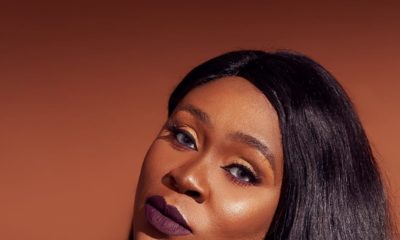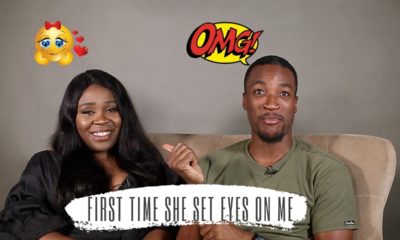Career
Dr. Urenna Onyewuchi Takes BN on a Journey into the Exciting World of Being a Nigerian Woman in STEM
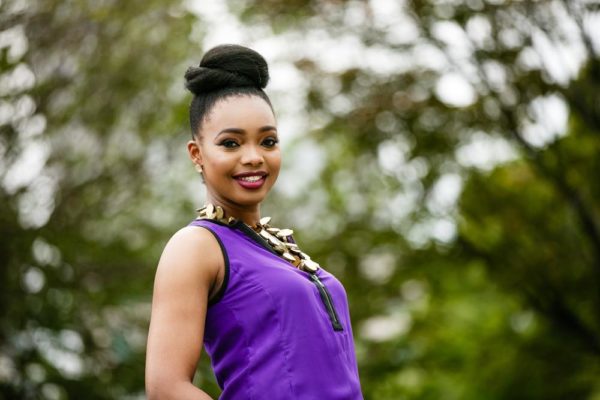 Anyone who attended Dority International Secondary School, Aba, at the time Urenna Onyewuchi manned its corridors as Deputy Senior Prefect, will attest to the fact that she was a sort of Cersei Lannister – one never to be crossed. Unlike Cersei of HBO’s Game of Thrones, however, Urenna’s passion for following rules to the letter, and serving “justice” to bad behaviour was not stemmed from malice; it was fuelled by a strong sense of discipline, a core trait which has since guided her and gained her numerous accolades and achievements.
Anyone who attended Dority International Secondary School, Aba, at the time Urenna Onyewuchi manned its corridors as Deputy Senior Prefect, will attest to the fact that she was a sort of Cersei Lannister – one never to be crossed. Unlike Cersei of HBO’s Game of Thrones, however, Urenna’s passion for following rules to the letter, and serving “justice” to bad behaviour was not stemmed from malice; it was fuelled by a strong sense of discipline, a core trait which has since guided her and gained her numerous accolades and achievements.
Based in America, Urenna is a global energy manager, with a specialisation in asset management of power systems and infrastructure. She is known as the smart meter subject matter expert in her organization. Having grown up in Nigeria and witnessed the poor electricity in her country, Urenna maintains a strong desire to bring electricity to Africa. She is also an advocate of African volunteerism, empowerment, and development.
She currently chairs a team of experts to steer Power Africa initiatives for Institute of Electrical and Electronics Engineers – Power & Engineering Society (IEEE PES)- an over-125- year-old global nonprofit.
In this interview with BellaNaija, Urenna shares her take on Science, Technology , Engineering & Mathematics (STEM) the present generation of Africans, and her overall vision for the continent.
***
Please give us an insight into your background
I graduated from Dority International Secondary School (D.I.S.S.) in Nigeria before moving to the US for my Electrical Engineering undergraduate degree in George Mason University, Virginia. I specialized in Digital Signal Processing. The hardcore D.I.S.S. training made college somewhat of a breeze. I finished up my Masters and Doctorate degrees at Georgia Institute of Technology, Georgia, U.S.A. The path to a Ph.D. wasn’t really planned. It showed up and I went with it. But I decided it had to be in electric power and had to utilise my data/signal processing background. That morphed into a specialization in asset management. I am happy with and grateful for my academic path.
Awesome! So, why Engineering?
That’s easy… NEPA! I think that one word says it all.
On a serious note though, my mum used to sit with me to do Math when I was a kid: I had been bad and wasn’t doing my homework in Primary 1 or so. With mum on my back then, I found I had a love for Math. Physics came when I was older. My dad is quite the researcher. He advised me to study electrical engineering given my analytical proclivities. With the NEPA situation in Nigeria and because I had a passion to impact power in the country, electrical engineering made sense.
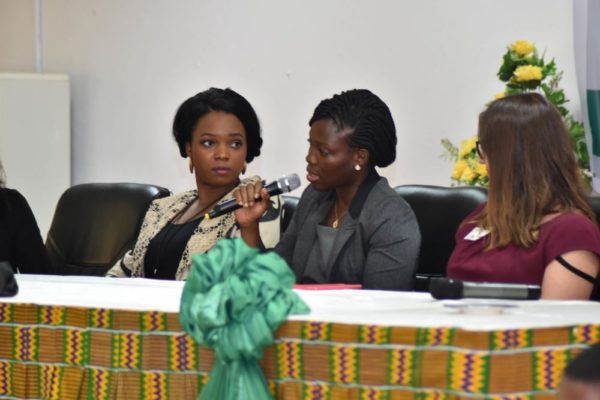
At a Women in Power Panel Accra Ghana
Was it difficult for you, especially as a woman, to earn a doctorate degree in engineering?
Getting a doctorate in engineering is TOUGH for all souls, talkless of electrical engineering. I tell ya. You could point out the Ph.D. students in the halls: they looked most frustrated. There is a higher level of challenges for women and another for “blacks” in the field: a double-whammy for a “black woman.” I had to fight against that stigma. Thankfully, Georgia Tech creates opportunities for smart, driven black people to get into graduate programs in Engineering – that helps.
Why do you think it’s important to get more women into engineering?
That’s an interesting question. A good one. Diversity is essential in EVERY field, for any company or institution to be strong in innovation. Race, gender, age… diversity is important. Women and men think differently. I know of companies, including Corning Incorporated, the company I work for, that made a killing (at some point) from products suggested by women.
We still need to go into primary and secondary schools (middle and high schools in US terminology) to expose girls to women in STEM. You can be a female in high heels and be a great engineer. However, I believe Nigeria needs more people with good-quality technical skills than engineers. There is an overpopulation of unemployed engineers in the country, if you ask me.
Are you planning to bring your skill and experience into the management of Nigeria’s power systems and infrastructure?
I am beginning to do this through my volunteer work with the Institute of Electrical and Electronic Engineers (IEEE). Though right now, the work is focused on Africa as a whole, I am getting to interface more and more with the Nigerian sector. There is still a whole lot more to do as I mentioned during my recent Channels TV interview: from regulatory issues to maintenance to education and more. At the appropriate time, I would be happy to work with the government, the African Development Bank, the African Finance Corporation on policy briefs and contracts to improve our power and infrastructure sectors.
I have an extensive academic, project and technical background that includes smart metering; energy management for manufacturing companies and businesses in general; managing relationships with foreign vendors; developing plans and writing reports on the maintenance of infrastructure; saving plants millions of dollars on asset protection; teaching engineering in the US and China, and more. I am looking out for the right opportunities in Nigeria. That being said, I continue to be excited about my awesome job at Corning Incorporated and my IEEE work for Africa.

At a Technical Session in Accra
Many STEM professionals participate in outreach programmes in order to connect with local communities; they also work with local STEM organisations to inspire the next generation to address matters such as the ‘skills gap’. How are you involved and why?
In Nigeria, I suppose NYSC is one medium through which Nigerian professionals in STEM can give back to the community. In general, I have found that many professionals do not give back enough yet. I mean all of the world. A lot of us are still consumed with money as a single driver to fulfillment. I am not judging: money is essential, but there is just too much work to be done in Nigeria and Africa. I believe that most professionals are overwhelmed with the work that needs to be done and are unsure where to begin. I have had African professionals in the diaspora send me messages on LinkedIn sharing such sentiments. I believe NYSC provides a formal community service program. The program needs a huge revamp and facelift but it is better than nothing. It is a good program for the younger, less-experienced folk to learn service and leadership. I appreciate it for that reason and a few others. I emphasize, though, that it needs a major facelift: several Botox injections.
How am I involved? I chaired the first ever IEEE Power and Energy Society (PES) Power Africa Conference outside of South Africa in Zambia. It was a move that was important since electricity access in South Africa and some parts of Northern Africa are already high. The needs in other parts of sub-Saharan African are dire. IEEE is perhaps the largest technical communities in the world, and therefore a good organization to be aligned with.
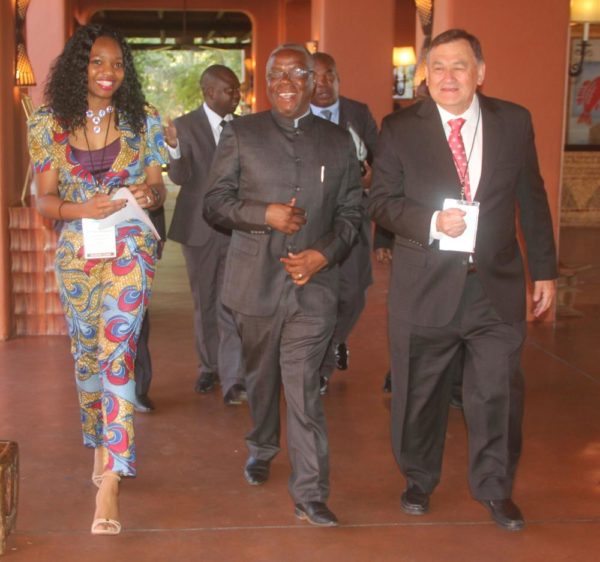
Walking with delegates Power Africa Zambia
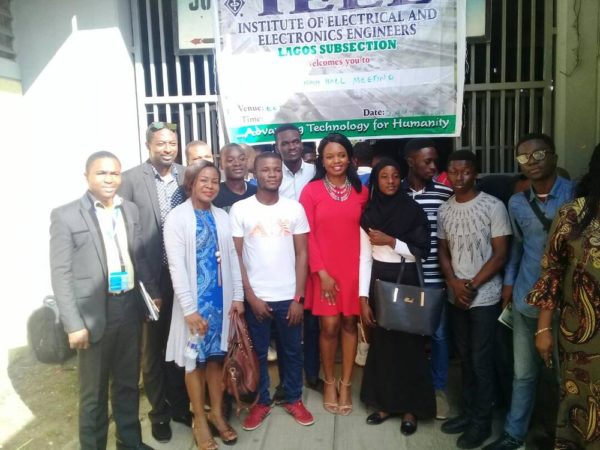
Finishing a Talk at UNILAG Volunteering
During my conference, I brought in over 30 secondary school girls from the community, with my team, to get exposed to female engineers. It was the most impactful part of our technical conference. The girls were wowed by seeing female engineers (and good-looking female engineers for that matter). Some of them changed their stories from wanting to be doctors and nurses to wanting to be female engineers someday. I also pioneered a partnership with an amazing society, the IEEE Smart Village, to sponsor over 20 potential ambassadors from different parts of Africa to join the larger conference. They went back to their communities as leaders, having learned how to build micro-grids and create business models for micro-grids.
Our conference this year was in Accra, Ghana, where I provided supervision over the planning. We replicated both programs I pioneered in addition to the keynote, panel and paper sessions, which are typical in these types of conferences. The conference grew by 35% this year. The next one will likely be in South Africa next year. The conference has provided an avenue for us to develop young Africans to a place of leadership and to give back to the continent. The educational, leadership, networking and social impact of the conference will be felt for a long time. This is a conference that is truly run for Africans by Africans. We have volunteers from all over the world (Africans and non-Africans) but there is a level of camaraderie and support you find in our Power Africa Conferences that you will NOT find anywhere else {click here to find out more}
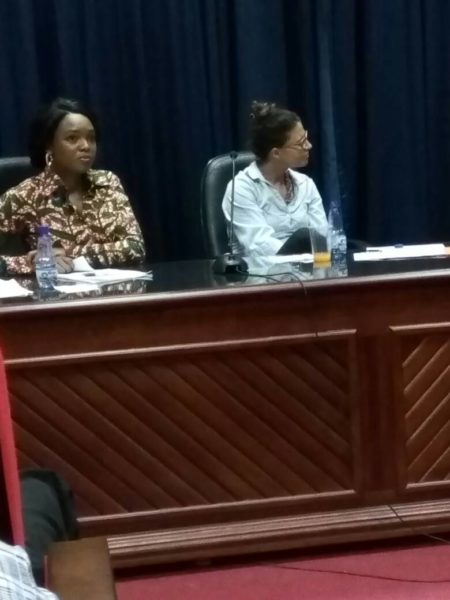
Accra Power Africa Town Hall with USTDA Clare Sierawski
That is so inspiring. So tell us about some of your greatest challenges and how you’ve tackled them
Learning to tackle male domination with grace. I have gone into manufacturing plants where the engineers and operators expect to see an older white male as the project leader but they see me. At those times, my presence is initially met with skepticism, but my knowledge and love for people pull them to me. It is a similar challenge that driven “black” women face in relationships. Because of the structure of our society today, most men find it difficult to relate with driven women for extended periods of time. Whether they feel a sense of intimidation or competition or just a fear of being perceived as weak, most men get straight-up uncomfortable and often rude. As a human being, when you are younger, you learn to attack and fight back: a shark-eat-shark type of mentality. When you are older (as I now am), I learn to see such trials as a gap in knowledge on the part of the men: they just don’t know better. I can either fight back or I can pull back and embrace them with grace. I am learning to practice the latter. It makes life easier, but more importantly, I find it helps the men be more understanding and accepting of who we are as driven women, and of their role to make the world better (with us). It helps them encourage other driven women as they should. My favorite people in the plants are the men, by the way. That is because the larger proportion of those working in the plants are still men.
What would you say are the socio-politico challenges Africa is currently facing?
An under-empowered youth population. I believe the youth population in Africa is starting to exceed other age ranges. But the older generation perhaps has not done enough to train the newer population on how to advance themselves and their communities. We are getting to a time where there may be power struggles between the old and the young. It should be a partnership instead. The older generation has the money. The younger generation has the drive. We’ll kill each other and get nothing out of it if we do not learn to work together. There are institutions outside Africa that do not want to see Africa succeed even if disguised as though they do. (See my Entitlement article on LinkedIn.) They will continue to create enmity amongst us. We must learn to see past that. A people unwilling to agree and work together will never reach their full potential. There is nothing any team cannot accomplish if they work as a team and ignore differences… or use the differences to their advantage. The Americans’ love for America (USA) is what has brought the US to where it is. People feel like it is their land: a my-land personality helps you want to work with others to make it beautiful. We need that: we need to own our land and work together. Be proud of your land.
Let’s talk about the article you just mentioned; what inspired that?
You’ll have to read it to know. Hahaha! I have learned that for myself and just about EVERYBODY I have observed, that when you hand out free stuff, you do not empower people to rise above where they are. You have to give people some fish so they know what they are missing. Then teach them to fish. Otherwise, all they long for is the fish, with no interest on how to get some.
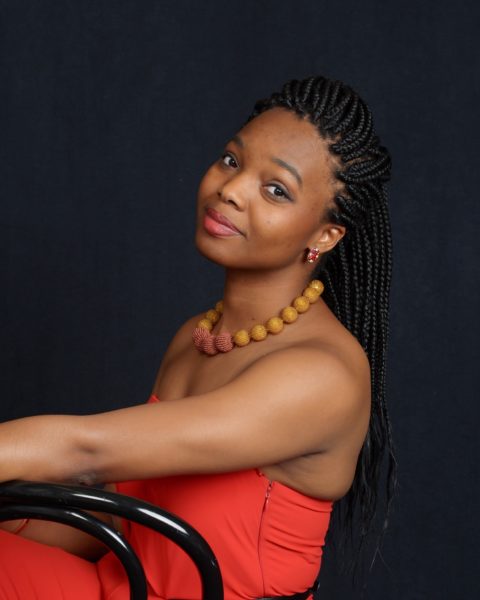 Do you believe that the young people of Africa today are lazy and unmotivated, compared to past generations?
Do you believe that the young people of Africa today are lazy and unmotivated, compared to past generations?
I would not say so. But if they are, it is because they have not been exposed to what they can be. I continue to be amazed at the innovation that took place in then-Biafra during the war. There is nothing we cannot do. It took a harsh war to bring engineering out of the East. I hate war. I think it is a horrible thing. I do not think people should fight. I do not want to see the youth making war to “prove they are motivated.” I want to see them having town hall meetings among themselves and with older caring folks to come up with solutions. Conversations about solutions are key. Nigerians, for instance, are awesome, awesome ,awesome at talking: about the government, about soccer, about winning championships, about their awards. We drink beers, smoke, go home and come back to do the same thing. The youth need to come up with solutions. I am excited about the start-ups in Africa. Some of them are quite original. Others are copy-cat solutions, but it is a shark market. Some will succeed. Others will not. It is one step in the right direction, but a lot has to be done. Young people carry the success of Africa in their very hands.
Do you think there’s hope for Nigeria? With regards to job creation and impressive infrastructural development?
As long as there is life, there is hope. There are driven, smart, EXPERIENCED Nigerians in Africa and the diaspora. Create opportunities and bring people home to solve the problems. We are exporting too much Nigerian money to foreign countries for solutions.
What are Nigerians best at, in your opinion? How can we use it to our advantage?
Camaraderie. I talked about the power of collaboration, agreeing and working together. We are good at eating together and partying together. We are a fun-loving people. We can use the same “skillset” to build a new Nigeria: the one we’ve always hoped for.
Are there simple fixes we can make as a nation to get us halfway to being a nation its citizens can be more proud of?
Yes. Cleanliness is next to godliness, abi? At my workplace in the US, janitors are constantly cleaning. Every time I land in Japan and China, I stop to gaze at the cleaners on the airport roofs wiping down glass etc. Something is getting cleaned all the time. If we infused a system of cleanliness into our culture, we’ll already go a long way: aesthetics, health, comfort. It’s something we can all be responsible for and not blame the government for. When we’ve done it around our surroundings, we can then blame the government for the extras. Every business should have a janitorial service for its plants and buildings. Every single one.
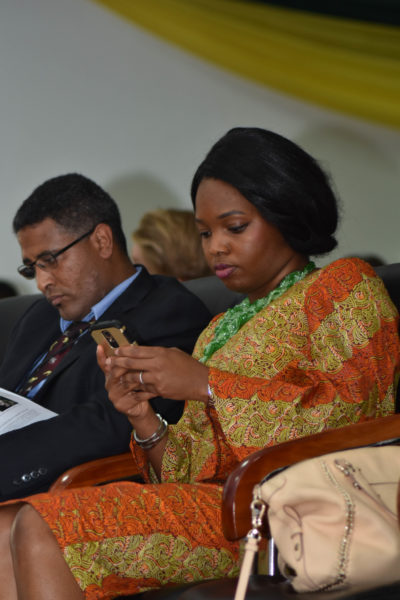 What future do you envisage for Africa as a whole?
What future do you envisage for Africa as a whole?
In the simplest terms, I see an Africa with clean water, clean streets, clean buildings and clean people. I see a power generation mix, ranging from clean coal technology to solar to hydro to wind, depending on the location of the regions on the continent. I see old and young Africans who are completely confident in who they are as a people: they do not bow down more to foreigners than they do to their own people. They see people with other skin colors as equal to themselves. They do not feel inferior. I see an Africa where a man loves his wife as himself so she can submit to him easily. I see an Africa where each person can create his or her own business and know how to get it supported, and where those who cannot start their own businesses do a great job working for others. I see an Africa where pastors and religious leaders are held accountable for their daily lives by the members of their churches or places of religion. Cleanliness, job opportunities, stable families, lack of hypocrisy, and pride in self and culture touch on physical and psychological needs that help strengthen economies. This is of course not an exhaustive list but they came to mind first.
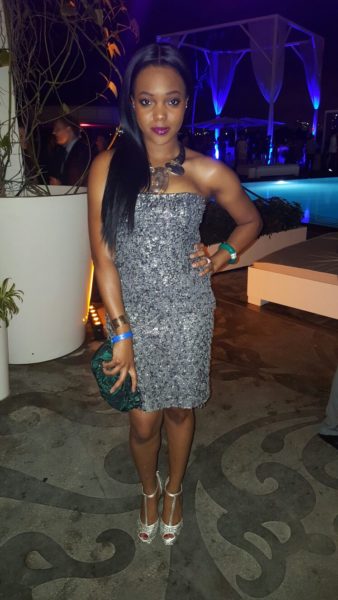
What drives you as a young, successful, African woman?
Passion to see Africa and Africans use most of their potential. There is nothing more painful than watching someone utilize a small fraction of what you know they have: knowledge, power, culture, beauty. It’s painful. I have worked to extract more from the Africans I work with in IEEE (and those I have mentored in Georgia Tech, Nigeria and along the way). So, I know where we can get to. I have seen where I have gotten to. Money, as a driver, can be a distraction: you miss the important things. But you need money to survive. So, it would be foolish to ignore it as you serve and work. They say money wins friends and influence sometimes. So, you have to create a balance.
We sure do! Okay, so on a more relaxing note, what are two of your favourite travel destinations?
Villages in the eastern part of Nigeria will always be my places of solace, but to avoid being a bore, I’ll say Kyoto, Japan and Eastern Cape, South Africa. They were amazing experiences. The first time I went to Japan, I was not sure what to expect of the country/island. I initially expected Asia to be entirely conservative (for some reason). I had gone to Kyoto from Osaka wearing a long resort-style blue dress and flats. Bad, bad idea. I took the train to Kyoto only to find Japanese girls in booty-shorts, and to behold a hill that would take me up to the temples… in my long resort-style dress. Chai! I made it to the top but I was drenched. That did not stop me from having a great time and getting to share smiles with the many people around me.
My Port Elizabeth-Eastern Cape trip was to die for. First of all, I was with my mother, who I am very close to. She kept me sane during my Ph.D. journey and is the reason why I love fashion and style. She dresses high-profile clients in Nigeria and the US, and can pick out the most amazing outfit from a store that looks otherwise boring. I love being with her. She hooks me up with the best outfits for trips. Sharing the beautiful Port Elizabeth (P.E.) waters with her was relaxing and refreshing. After P.E., we were privileged to spend a weekend at a resort called Hlosi Lodge in the Eastern Cape. Words cannot express the awesomeness of this resort. I’ll try with three words: safari, outdoor shower. If you do not know the excellence of a resort-style outdoor shower, go get that experience. Especially when you can see warthogs, giraffes and God knows what out in the wild as you shower. No words! Check out the lodge’s pictures online, though they do it no justice. Just go there! Tell them I sent you. Hahaha!
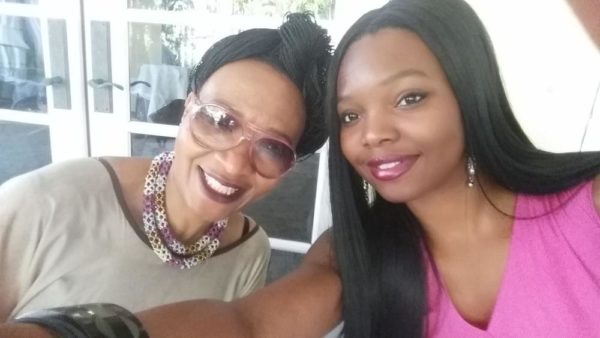
Urenna + Mum
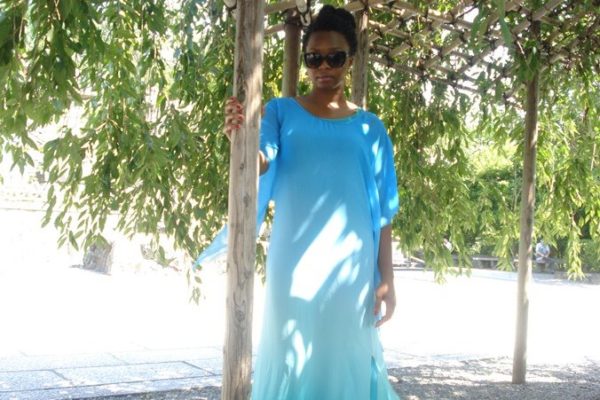
What is your favorite African/Nigerian TV show? Why?
I loved Shuga. The acting, locations, etc. were on point. Mostly, I loved that it portrayed the lives of many college girls and boys who forget the consequences of philandering. I think the word is mostly used on men, but hey, I just expanded it to include women. It created the right amount of discomfort around how to contract HIV. I had my guy-friends over this one weekend and told them I had a show I’d love them to watch. They complained about having no interest in chick-flicks. They ended up binge-watching the show and shaking in their boots.
And music…who is your favorite artiste and why?
By far, 2baba. He has always been my favorite artiste in the world. I love that he sings about “one love” for Africa. That he sings about peace and forgiveness. His songs make sense and are useful, unlike all our booty-shaking and sexual songs these days that end up sounding the same: American, Nigerian, other songs. 2baba is different. As you can tell, I love different. I hope I meet him someday. There are other artists I like: including Phyno and Flavour, among others.
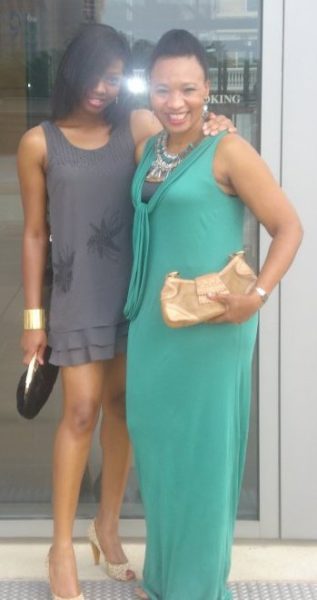
Urenna and her mum
Tell us about your work-life balance
For a long time, I always had work on my mind: waking up, sleeping, all the time. I’m learning to slow down my pace in life. I tend to be a fast mover. Sometimes you miss things moving so quickly. I’m learning to slow down. Fortunately, my partner is a fast mover too: he doesn’t slow me down. We spend time talking about how to be better and try to make decisions that will bless our family and community.
On a final note, what’s your advice to young people who want to make a difference but aren’t sure how?
Create an alliance. Find others, who like you, want to make a difference. Then find an older, experienced person who is making a difference. Create a goal, vision and objectives for your initiative. Get started. They could also go online and search for initiatives that are already established. Sign up and work! It is too difficult and probably not worth it to strive to create a successful sustainable initiative all by yourself. Try to work with a like-minded team of people.
Thank you so much for talking to us at BellaNaija. We know you have inspired a lot of our readers today. Keep up the good work, and continue being an awesome role models to women.
***
You can follow Dr. Urenna Onyewuchi on IEEE Power Africa’s Facebook at and Instagram.


